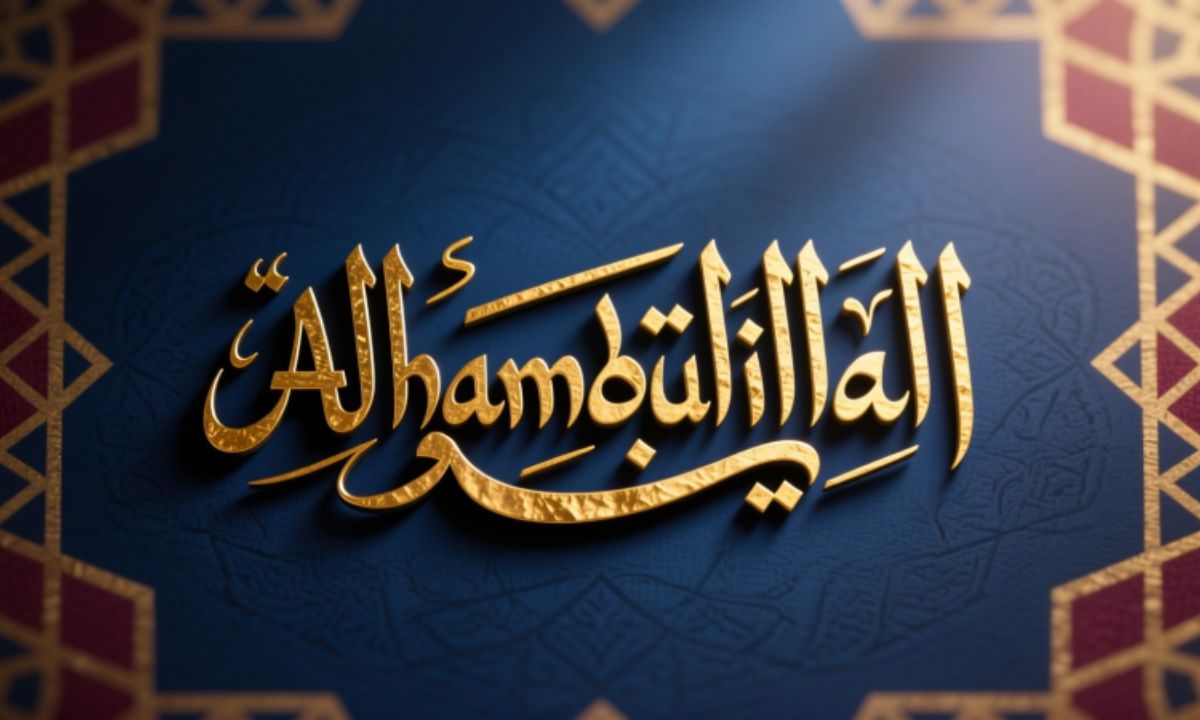Alhamdulillah is one of the most beautiful Arabic phrases you’ll hear every day in Egypt. Egyptian people say “الحمد لله” (Alhamdulillah) to thank Allah for everything in their lives. This simple phrase means “praise be to God” and shows deep gratitude and faith.
In Egyptian Arabic, Alhamdulillah is more than just words – it’s a way of life. You’ll hear Egyptians say Alhamdulillah when things go well and even during difficult times. Whether someone asks “how are you?” or shares good news, the response often starts with this blessed phrase that connects hearts to their Creator.
What Does “Alhamdulillah” Mean in Arabic?
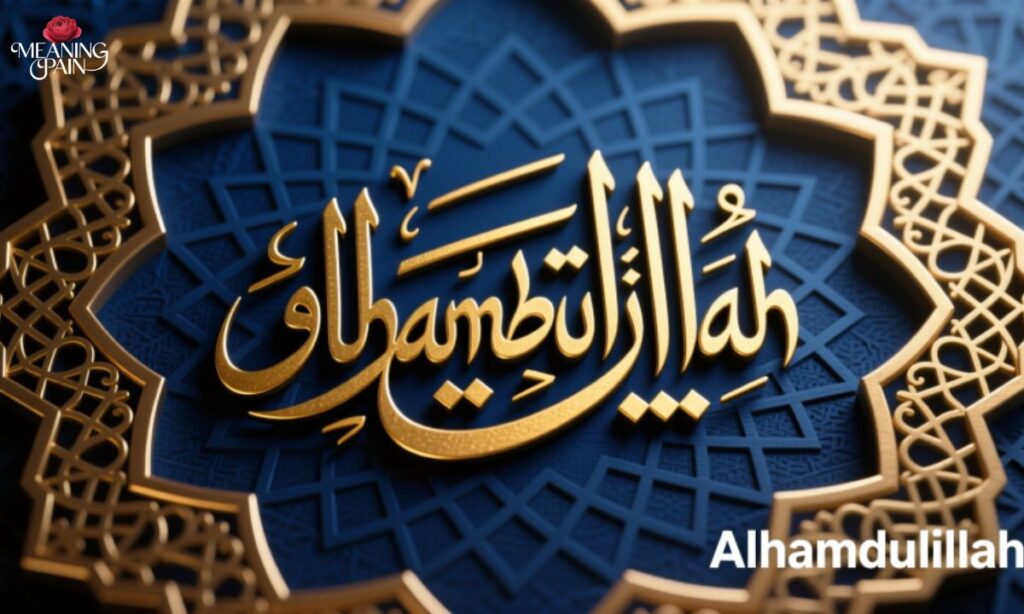
- Alhamdulillah means All Praise to Allah — الحمد لله
- It shows thankfulness to Allah — الشكر لله
- Muslims say it to thank Allah — المسلمون يقولونها لشكر الله
- It means Gratitude for everything — الامتنان لكل شيء
- It is a beautiful Islamic phrase — عبارة إسلامية جميلة
- It expresses peace and satisfaction — تعبر عن السلام والرضا
- It is said after good or bad times — تُقال في الخير أو الشر
- It reminds us Allah is the provider — تذكرنا أن الله هو الرازق
- It means Praise be to God — الحمد لله
- It shows faith and belief — تدل على الإيمان والاعتقاد
- It is said when something goes right — تُقال عند حدوث شيء جيد
- It is used in daily Muslim life — تُستخدم في حياة المسلم اليومية
- It means Thanks to Allah for blessings — الشكر لله على النعم
- It brings calmness and positivity — تجلب الهدوء والإيجابية
- It is a universal phrase of worship — عبارة عالمية للعبادة
The Literal Translation of “Alhamdulillah”
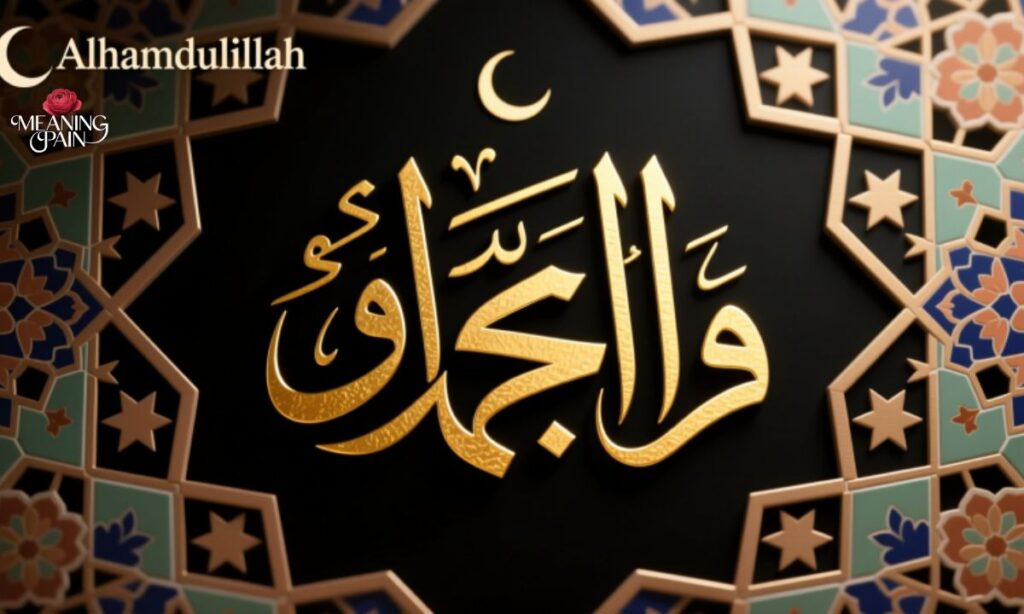
- “Al” means The — الـ تعني الـ
- “Hamd” means Praise — الحمد تعني المدح
- “Li” means To or For — لـ تعني إلى أو من أجل
- “Allah” means God — الله تعني الله
- So it means “All Praise is for Allah” — يعني “كل الحمد لله”
- It combines praise + gratitude — تجمع بين المدح والشكر
- It means complete thanks to Allah — الشكر الكامل لله
- It’s a declaration of worship — إعلان للعبادة
- The phrase gives credit only to Allah — تعطي الفضل لله وحده
- It means no one deserves praise except Allah — لا يستحق الحمد إلا الله
- It’s the opening of Surah Al-Fatiha — هي بداية سورة الفاتحة
- It connects heart and tongue in praise — تربط القلب واللسان في الحمد
- It means continuous gratitude — تعني الامتنان المستمر
- The literal sense is praise to Allah — المعنى الحرفي هو الحمد لله
- It means acknowledging Allah’s mercy — الاعتراف برحمة الله
“Alhamdulillah” in Arabic Text (الحمد لله)
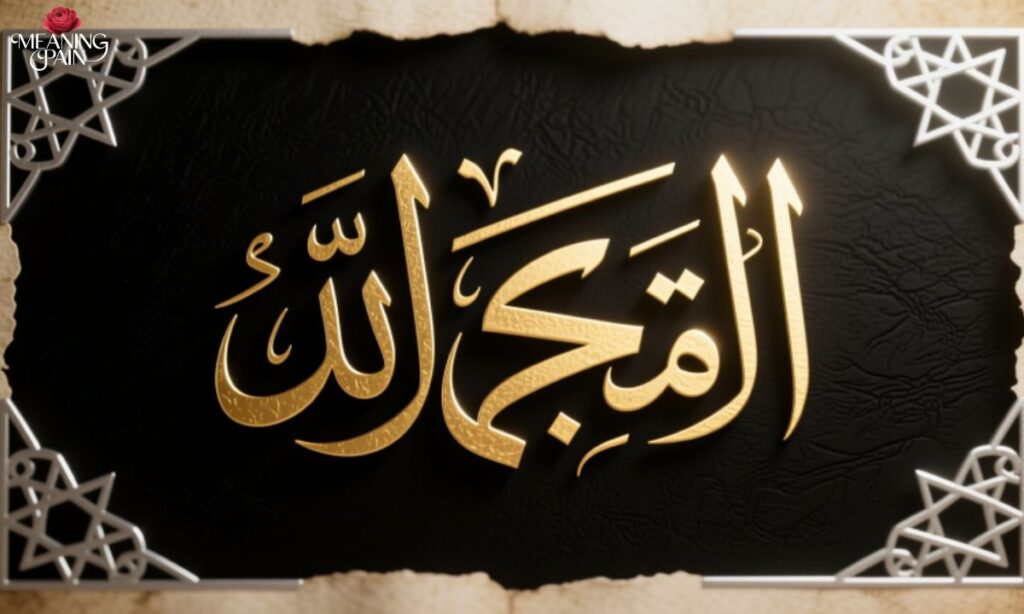
- Written as الحمد لله — means All praise is for Allah
- Arabic letters: ا ل ح م د ل ل ه
- Starts with Alif (ا), ends with Ha (ه) — يبدأ بالألف وينتهي بالهاء
- It’s a Qur’anic expression — تعبير قرآني
- Found in Surah Al-Fatiha verse 2 — موجود في سورة الفاتحة آية ٢
- Used by Muslims worldwide — يُستخدم من قبل المسلمين حول العالم
- Arabic script shows beauty and respect — الخط العربي يظهر الجمال والاحترام
- Commonly seen on Islamic art and calligraphy — يُرى غالبًا في الفن والخط الإسلامي
- الحمد means Praise — الحمد تعني المدح
- لله means To Allah — لله تعني إلى الله
Read More: https://meaningpain.com/salam-meaning-in-arabic/
Pronunciation and Roman Spelling of “Alhamdulillah”
- Pronounced as Al-ham-du-lil-lah — النطق: الحَمدُ لله
- Four syllables: Al / ham / du / lil / lah — أربع مقاطع صوتية
- “Al” is soft, “ham” is clear — الـ ناعمة، حمد واضحة
- “Du” connects smoothly to “lillah” — تُنطق بسلاسة مع لله
- English spelling: Alhamdulillah — التهجئة بالإنجليزية
- It sounds calm and spiritual — يبدو هادئًا وروحانيًا
- The double ‘L’ in “Lillah” is stressed — اللام المزدوجة مشددة
- Meaning: All praise belongs to Allah — المعنى: كل الحمد لله
- Often said after achieving success — تُقال بعد النجاح
- Brings peace to the heart — تجلب السلام للقلب
The Root Word and Linguistic Meaning
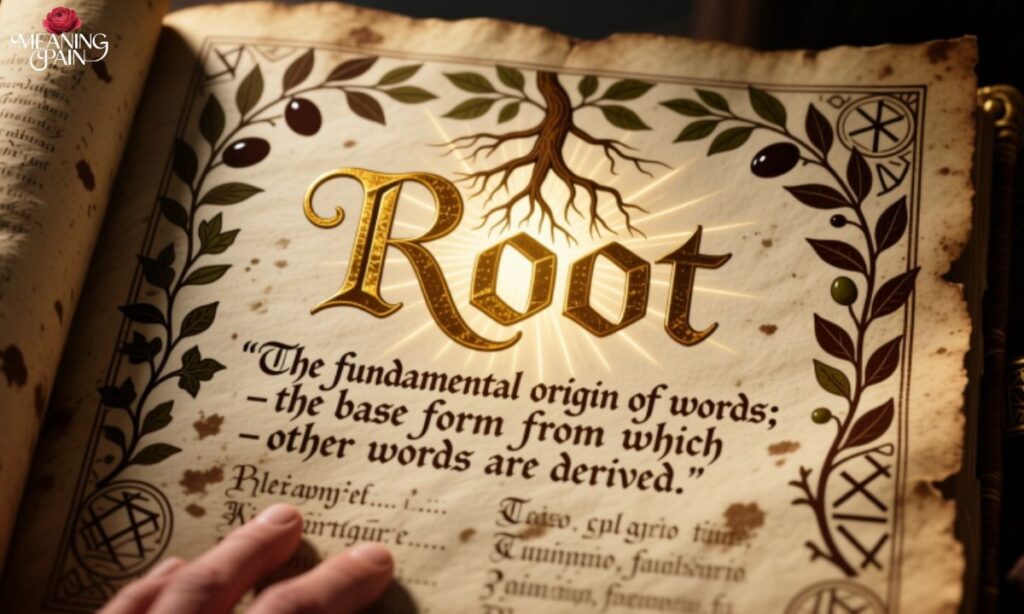
- The root of Alhamdulillah is “Hamd” (حمد) — meaning Praise or Thanks.
- “Al” (ال) means The — making it “The Praise”.
- “Li” (لـ) means To or For — directed to Allah.
- “Allah” (الله) means God, the Creator.
- Together: “Al-Hamd-u-Li-Allah” — All praise is for Allah.
- Linguistically, it combines Gratitude (شكر) and Praise (مدح).
- It’s a perfect Arabic expression of thanks and worship.
- Used to acknowledge Allah’s mercy and power — الاعتراف برحمة الله وقدرته.
- The root word appears many times in the Quran.
- It is a divine expression showing humility.
Quranic References of “Alhamdulillah”
- Found in Surah Al-Fatiha (1:2) — “Alhamdulillahi Rabbil Aalameen” (الحمد لله رب العالمين) — “All praise is for Allah, Lord of the worlds.”
- Appears in Surah Al-An’am (6:45) — after Allah saves people.
- Used in Surah Yunus (10:10) — as the final call of Paradise.
- Mentioned in Surah Saba (34:1) — expressing thankfulness for blessings.
- The Quran uses it to teach gratitude and remembrance.
- Every time it appears, it shows praise to Allah alone.
- It opens the Quran’s first chapter — a symbol of worship.
- It ends many divine stories, showing thankfulness.
- It connects the believer and Creator through words of praise.
- Meaning: “All gratitude belongs to Allah” — كل الشكر لله.
When and How Muslims Use “Alhamdulillah”
- Muslims say “Alhamdulillah” after sneezing — to thank Allah for health.
- After eating or drinking, to show gratitude for food.
- When something good happens, to thank Allah.
- Even after hardship, to accept Allah’s will.
- Common reply when asked, “How are you?” — “Alhamdulillah.”
- It shows faith, patience, and contentment — الإيمان والصبر والرضا.
- It’s said quietly or aloud, both accepted.
- Used in prayers and conversations.
- Expresses spiritual peace — السلام الداخلي.
- Means “I’m thankful no matter what” — أنا شاكر مهما كان.
Cultural and Daily Life Usage in Arabic Countries
- In Egypt, Saudi Arabia, and Jordan, it’s used daily.
- After eating: “Alhamdulillah, it was delicious” — الحمد لله كان لذيذًا.
- After safety: “Alhamdulillah ala el-salama” — الحمد لله على السلامة.
- People say it when waking up or sleeping.
- It’s a symbol of good manners in Muslim culture.
- In Arabic homes, it’s a phrase of peace and gratitude.
- Common in greetings and responses.
- Written in calligraphy and wall art — الخط العربي والزخرفة.
- Represents hope, thanks, and love for Allah.
- It unites Muslims globally through one phrase of praise — يوحد المسلمين بعبارة واحدة من الحمد.
“Alhamdulillah” in Egyptian Arabic Explained
- In Egyptian Arabic, it’s said as “Elhamdulillah” (الحمد لله) — meaning Thanks be to Allah (الشكر لله).
- Egyptians pronounce it softly, like “El-ham-do-lil-lah.”
- It’s used after good news, meals, or safety.
- Common phrase: “Elhamdulillah 3ala el-salama” (الحمد لله على السلامة) — “Thank God for your safety.”
- Egyptians use it to show relief and joy — يعبرون بها عن الفرح والراحة.
- It reflects faith, gratitude, and peace.
- It means All Praise to Allah — كل الحمد لله.
- It’s part of daily greetings and conversations.
- Even non-religious people use it for thanks.
- It connects everyday life with faith — تربط الحياة اليومية بالإيمان.
Common Mistakes in Writing or Pronouncing “Alhamdulillah”
- Some write “Alhamdullilah” — ❌ incorrect spelling.
- Correct form: ✅ “Alhamdulillah” (الحمد لله).
- The “du” sound should not be skipped.
- Avoid writing “Alhamdillah” — it removes the letter “u.”
- Correct pronunciation: Al-ham-du-lil-lah — النطق الصحيح: الحَمدُ لله.
- Some forget the stress on “lillah.”
- Do not say “Alhamdilla” quickly — pronounce it clearly.
- Always remember four syllables: Al / ham / du / lillah.
- Written Arabic form: الحمد لله — with space between words.
- Meaning stays: All Praise is for Allah — كل الحمد لله.
Difference Between “Alhamdulillah” and “Subhanallah”
- Alhamdulillah (الحمد لله) means All Praise to Allah — الشكر لله.
- Subhanallah (سبحان الله) means Glory be to Allah — المجد لله.
- Alhamdulillah expresses thanks and gratitude.
- Subhanallah shows awe and wonder at Allah’s creation.
- Example: You eat food → say Alhamdulillah.
- You see a beautiful sky → say Subhanallah.
- One means thankfulness, the other admiration.
- Both are dhikr (remembrance) of Allah — ذكر الله.
- They build peace and spiritual connection.
- Using both keeps a believer’s heart pure — يُنقّي القلب بالإيمان.
Benefits of Saying “Alhamdulillah” Daily
- Brings peace and positivity — تجلب السلام والإيجابية.
- Increases gratitude in your heart — يزيد الامتنان في القلب.
- Strengthens faith and patience — يقوي الإيمان والصبر.
- Reminds you of Allah’s blessings — تذكير بنعم الله.
- Helps you stay calm in hardship — يهدئك في الأوقات الصعبة.
- Spreads hope and happiness — ينشر الأمل والسعادة.
- Builds a thankful attitude — يبني روح الشكر.
- Protects you from pride and anger — يحميك من الغرور والغضب.
- Brings reward and mercy from Allah — يجلب الأجر والرحمة من الله.
- Keeps your soul peaceful every day — يجعل الروح مطمئنة يوميًا.
The Beauty of “Alhamdulillah”
- Alhamdulillah is more than a word — it’s a way of life.
- It teaches gratitude and humility — يعلم الشكر والتواضع.
- Reminds us that Allah is in control — الله هو المتحكم بكل شيء.
- It connects heart, mind, and tongue in praise.
- Used by Muslims worldwide with love.
- It’s part of Quranic language and faith.
- Brings spiritual comfort in every situation.
- The phrase is timeless and universal.
- Meaning: All praise and thanks belong to Allah — كل الحمد والشكر لله.
- Saying it daily fills life with peace, joy, and faith — يملأ الحياة بالسلام والإيمان.
Frequently Asked Questions
What’s the meaning of Alhamdulillah in Arabic?
Alhamdulillah (الحمد لله) means “All praise is for Allah” or “Thanks be to God.” It’s used to express gratitude and peace.
How to write رضی الله عنه short form?
The short form is (RA) or R.A., which stands for Radiyallahu Anhu (رضي الله عنه) — meaning “May Allah be pleased with him.”
What is an example of Alhamdulillah?
Example: “I got a new job, Alhamdulillah.” It means you thank Allah for your blessing or success.
What is the meaning of إن الله مع الصابرين?
It means “Indeed, Allah is with the patient” — إن الله مع الصابرين shows that Allah supports those who remain patient.
What is the meaning of بإذن الله?
Bi’idhni Allah (بإذن الله) means “By the permission of Allah” — used when expressing hope or future actions with faith.
Conclusion
The phrase “Alhamdulillah” (الحمد لله) in Egyptian Arabic means “Thanks be to Allah” and is spoken with love and peace. Egyptians say “Elhamdulillah” in daily life to express gratitude, joy, or relief.
It reminds people to thank Allah in every situation, whether good or bad. This simple phrase spreads faith, calmness, and positivity in every Muslim’s heart.

James Dean was an American actor and cultural icon of teenage rebellion, best known for Rebel Without a Cause, Giant, and East of Eden.
